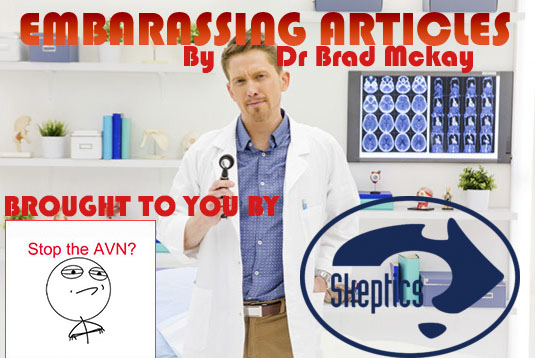By Charlie Eclaire

According to Wikipeadia, “The pot calling the kettle black” is an idiom used to claim that a person is guilty of the very thing of which they accuse another. Never has this saying been more true thanks to Dr. Brad McKays article titled “Are vitamins doing you more harm than good?”.

Who is Dr Brad Mckay?
For those that don’t know Dr. Brad McKay is a GP & host of the show Embarrassing Bodies Down Under. His show has been so successful that a spin off version was recently created deservingly titled Embarrassing Articles in which, Dr. McKay once again takes a starring role. For his first assignment Dr. McKay suggests that taking high doses of vitamins and supplements could increase your chances of heart disease and cancer.
Given his recent involvement with the Skeptics and their continuous calls for pseudo-science enthusiasts to back up their claims with gold standard evidence based medicine, I expected nothing less from Dr. McKays article. Using my very expensive nit microscope that came free with the nit kit I used to treat my children’s hair, I scanned furiously through the article looking for the “recent” study he mentions. It seems however that Dr. McKay didn’t get the memo from his new pals at the Australian Skeptics inc, instead opting for unbacked, misinterpreted false claims of a paper he dared not cite.

Rather than provide you with evidence to substantiate his claims, Dr. McKay offers many examples seemingly written for those with a third grade comprehension level. Six of these have been quoted below in bold. Case in point, the pot calling the kettle black;

- “In a world full of modern conveniences it’s easy to think that we can solve our problems with a pill or a powder… Are we just fooling ourselves?” It seems Dr. McKay has forgotten the foundations of the profession he prides himself on are based on this exact theory.

- “Australians spend billions of dollars every year on vitamins and dietary supplements based on clever marketing”. Whilst I don’t doubt the validity of this claim, the only vitamin and supplement manufacturers who I could find that were guilty of deceptive marketing were ones made by pharmaceutical companies. Contained within the study (spoiler alert, I did eventually find the study, more on that later) in question is mention of a One-A-Day Men’s Health supplement in which its manufacturer Bayer, claimed it could prevent prostrate cancer. Despite null findings from SELECT, Bayer refused to stop its fraudulent marketinguntil after it was threatened with a lawsuit. Bayer is a pharmaceutical giant who’s net profit for the period ended March 31 was estimated at AU$2.35 billion. A similar incidentoccurred in Australia less than a month ago where the makers of Neurofen were fined $1.7m for misleading customers on ‘specific pain’ relief range. Water off a ducks back for a company that has an annual turnover estimated at AU$13.8 billion. It seems Dr. McKay suffers from selective “Hear no, Speak no” syndrome. Rest assured, there’s likely a falsely marketed pill that can help you with this Dr. McKay and if not, I’m sure your colleagues will happily prescribe you something off label.

- “Scientific evidence hasn’t shown a significant health benefit from taking extra vitamins if your levels are normal”. Do you remember the study they did on non diabetics taking extra diabetic medication showing increased health benefits? Yeah, me neither.
- “Medicine prescribed by your doctor has gone through a rigorous process of scientific testing to examine safety and effectiveness”. This is true for most but not all medications and especially not true for vaccines, which are not required to undergo the same gold standard of medical research as other pharmaceutical drugs. Instead of using real placebo’s like saline, controlled placebos are used to determine safety which can only yield a positive result. There has also been NO study EVER done to determine the safety of the current (or perhaps any) schedule offered in Australia yet doctors are injecting thousands of children with up to 8 antigens in a single consult daily and up to 41 antigens by age 4.

- “Companies wanting to sell their products in Australia only need to fill out an online form, supply information about their product and pay a fee to the Therapeutic Goods Administration (TGA), but the product itself is not tested. The TGA relies on companies to tell the truth and monitor their own products. Apart from this trust system, there’s no way of knowing if you’re getting what you pay for, or even if it is safe to swallow” – Well, that just cemented my trust in pharmaceutical companies! Truth, ha! – The difference between any product including pharmaceuticals but NOT vaccines is that any products making false claims, or causing any adverse reaction could be sued. Vaccine manufacturers are shielded from liability including the government and the doctor/nurse administering it which means NO ONE can be sued in the event of an adverse reaction to a vaccine even if the vaccine is tainted. This gives bad pharma all the reason in the world to ensure safety of their product right?
- “Products sold over the counter….may contain more, little or none of the listed ingredients. Some companies are doing the right thing, but others are taking advantage of the TGA’s self-monitoring system”. Without any evidence, one can’t take the legitimacy of this claim seriously unless Dr. McKay is referring to pharmaceutical products which are notorious for making false claims. Take for example a case currently before the U.S courts which alleges Merck, the manufacturer of the MMR vaccine “”failed to disclose that its mumps vaccine was not as effective as Merck represented, (ii) used improper testing techniques, (iii) manipulated testing methodology, (iv) abandoned undesirable test results, (v) falsified test data, (vi) failed to adequately investigate and report the diminished efficacy of its mumps vaccine, (vii) falsely verified that each manufacturing lot of mumps vaccine would be as effective as identified in the labeling, (viii) falsely certified the accuracy of applications filed with the FDA, (ix) falsely certified compliance with the terms of the CDC purchase contract, (x) engaged in the fraud and concealment described herein for the purpose of illegally monopolizing the U.S. market for mumps vaccine, (xi) mislabeled, misbranded, and falsely certified its mumps vaccine, and (xii) engaged in the other acts described herein to conceal the diminished efficacy of the vaccine the government was purchasing.” In case you’re thinking that this is an isolated incident, see here, here, here and lots more here for further examples of the many and regular cases of bad pharma fraud.
If you’re a freethinking individual accustomed to the natural medicine bashing pharma supporting propaganda drilled into the population ad nauseum, then you’ll know that to make a lie truth, the media will repeat it over and over using varying sources. Having realised I would not find anything concrete within Dr. McKay’s article which proved his claims, I started checking for other publications in pursuit of this elusive study.
The first piece I came across was from The Conversation which has been described byQuadrant Magazine as a “one-sided,” “lavishly-funded,” and “staffed by left-leaning refugees from commercial news organisations’ withered operations.” In all fairness to the Conversation, I dare say all media outlets would be in the running to win the same or similar award if such an award existed. Alas, I digress.
Instead of trying to substantiate its claims with real evidence, The Conversations piece titled “Supplements are an expensive and potentially toxic lucky dip” elects to use anecdotal proof, the gold standard of medical certainty it seems. That proof comes from linking to anotherarticle which claims “Data obtained from national organ donation registries shows, since 2011, three liver transplants and three kidney transplants have been given to people who got sick after taking some kind of herbal supplement”. It later goes on to say that one man required surgery after just a few months of taking a supplement with green tea extract. You’ve likely heard the phrase “correlation doesn’t equal causation” however we can now see, thanks to The Conversation, that it does but only when it supports bad pharma agenda. If your child stops breathing within minutes of being vaccinated, it’s a coincidence but if you take green tea extract and need a liver transplant within months, then the cause is of no doubt. I sure hope those 6 people who had transplants didn’t eat chocolate, or drink alcohol otherwise there would surely be a call to boycott them too?
The Conversations tag line ‘Academic rigour, journalistic flair’ seems to believe that the pinnacle of academic rigour is based on using evidence from another media source without any obvious fact checking. With writing flair no better than that of a lemming on steroids, I moved onto the next link provided, an article published by The Guardian in April 2015. Here we find another link and mention that the study in question was from 2012 conducted by the University of Colorado. In case you missed the obvious, 2012 was 4 years ago, hardly recent. This now lends the question, why release these findings now? Could it have something to do with this study released by John Hopkins University last week which found that medical negligence was the third biggest killer of Americans, right behind heart disease & cancer? Hmmmmm.
The link provided by The Guardian direct to the University of Colorado Cancer Centre is where things become more interesting. With a similar eye catching headline as the other pieces, the page concludes with “Many recent news reports stemming from this news release present incomplete data” followed by a link to the full study. After much searching, there it was, the final piece of the puzzle. The actual study they used to make these outlandish claims.
Published in the Journal of the National Cancer Institute by Byers et al, the study reviewed several trials involving thousands of patients. The conclusion states;
“We have argued that dietary supplements should not be directly or indirectly marketed for cancer prevention”
And this;
“In the absence of convincing evidence…we probably do not need more trials in nutrient-replete populations”…. Ummmm what? Nutrient replete populations??? “The value of conducting trials in populations with poor nutrient status has been shown….we will require studies that evaluate the impact of many years, rather than a few years, of nutritional supplementation”.
It also concludes by stating that scientists and government officials should encourage the public to make prudent decisions based on sound scientific evidence. And that’s it. The undeniable link between vitamins, supplements and cancer and/or heart disease and organ transplants was so glaringly obvious that they forgot to mention it in their concluding remarks.
So how could they make such a claim of link to cancer when the studies conclusion doesn’t even support that hypothesis? Within the body of the analysis, it mentions; “Several antioxidant trials have actually reported increased risks with supplementation. The most prominent example, β-carotene and lung cancer…” However buried deep within that study is the admission that they used a synthetic dl-alpha-tocopherly acetate (50% powder) and synthetic beta caratone (10% water-soluble beadlets); all formulations were coloured with quinolone yellow”. This study also concludes by saying “…this trial raises the possibility that these supplements may actually have harmful as well as beneficial effect”. There is no doubt this synthetically produced nutrient void product was also manufactured by bad pharma. It does not take a genius to see that a synthetic product will not yield the same outcome of its natural counterpart.
So what can be drawn from this unrelenting witch-hunt against natural medicine? Don’t trust what you hear in the media and don’t quote anything you read as fact unless you’ve taken the time to check the facts yourself. Also, If you choose to use vitamins and supplements, see a Naturopath to determine what you actually need, if anything, and avoid purchasing any brands manufactured by bad pharma because you’ll likely end up with a falsely labeled, synthetic, watered down version of it’s natural source. I bid you farewell until the next installment of embarrassing articles by Dr. McKay.
Source
